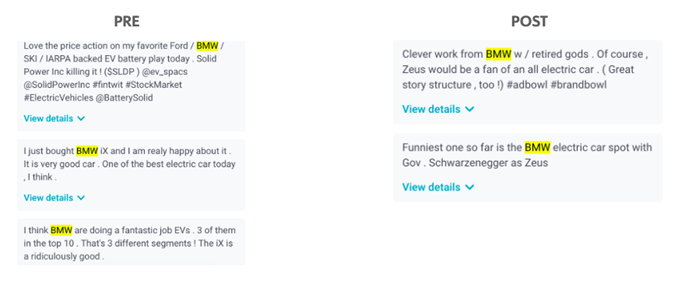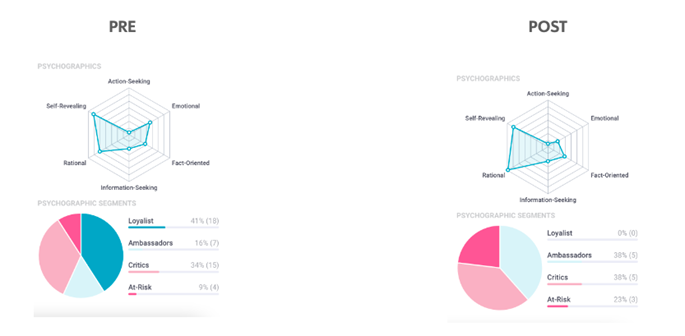Super Bowl commercials are as anticipated as the game itself, and major brands go to great lengths to be the talked-about ad at the water cooler the next day. This year, BMW’s entry starred everyone’s favourite actor-turned-California-governor, Arnold Schwarzenegger, alongside Salma Hayek to promote their new electric BMW iX.
With 141 million viewers within 24 hours, the ad received incredible engagement on Twitter, and mentions of the BMW iX skyrocketed by 941% in the following week.
In terms of engagement, it was an unassailable success for BMW, but engagement is only part of the story. Did the ad, along with other electric car commercials featured that night, have a broader impact on sentiment towards electric vehicles (EVs) in general? We set our researchers on the case using our advanced technology to measure how the campaigns were received on social media, and whether they successfully changed the conversation around EVs.
Super Bowl 2022: The Year of Electric Car Ads
BMW wasn’t the only brand to advertise its electric vehicle during the Super Bowl. General Motors (GM), Polestar, Kia and Nissan all chose to feature their EVs in the most coveted commercial slot of the year.
The prevalence of electric car ads even warranted a comment from @POTUS, who Tweeted “The ads during last night’s Super Bowl were clear: The future of the auto industry is electric.”
BMW took the crown for most engagement and, in our opinion, it was the most entertaining ad of them all.
Arnold Schwarzenegger plays a retired Zeus who has exchanged Mount Olympus for Palm Springs. Zeus struggles with his newfound domesticity and gets frustrated powering everyday electronic items including his microwave and a hedge trimmer, eventually causing a power outage while trying to fix the lighting system in his home.
His wife, Hera (Salma Hayek), comes to the rescue, gifting Zeus his own electrically powered BMW iX. The ad ends with a re-energised Zeus cruising his way through downtown Palm Springs with Hera singing “Electric Avenue”.
Measuring Social Media Sentiment towards EVs Pre and Post The Super Bowl
We were curious to find out how the ads featured that night successfully impacted sentiment toward electric vehicles in general.
The Sentiment Report
We scraped 23,334 social media comments across Twitter, YouTube and Facebook mentioning electric cars. We analysed social media comments in February 2022 pre (11,452), during (4,712) and post (9943) the Super Bowl for comparison.
The search included mentions of 51 major car brands including Audi, BMW, Chevrolet, Citroen, Ferrari, Fiat, Ford, GMC, Honda, Jeep, Kia, Land Rover, Lexus, Mercedes, Nissan, Peugeot, Renault, Seat, Toyota, Volkswagen and Volvo.
The Findings
The results were fascinating and unpredictable. Here are just some of the findings from our report.
Net sentiment rose briefly, then slumped
Pre-Super Bowl, net sentiment stood at -22% with price being a major inhibitor to positive net sentiment. During the Super Bowl, net sentiment briefly rose to -17%, but this figure slumped to -24% in the weeks after.
Emotionality rose during the Super Bowl
During the Super Bowl, commentators reacted more emotionally towards electric cars, but afterwards, emotionality fell back down to pre–Super Bowl levels.
Criticism switched to target the EV industry
Before Super Bowl, criticism was often not directed at e-automobility itself, but at the politics of creating a supportive infrastructure. After the Super Bowl, criticism flipped.

Recommendations disappeared
Pre the Super Bowl, electronic cars had a relatively high recommendation score of 45% on Twitter, but post-Super Bowl, there were barely any comments featuring recommendations whatsoever.

Loyalists were less vocal
Pre-Super Bowl the content of comments mentioning BMW e-cars centred around the product itself, afterwards commentators solely focused on the ad. Brand loyalists broke away from the conversation entirely.

Our psychographics map told the same story:

Take away
The results were surprising. On a surface level, the Super Bowl ads appeared to be a complete hit. If you look solely at initial engagement figures, it seems the campaigns were a triumph. However, looking deeper at the data, we can see that the ads did not successfully address the issues that commentators have with electric vehicles, and that net sentiment was actually negatively impacted in the long run.
While the commercials got people talking, the BMW iX ad didn’t appear to engage loyalist customers, and the percentage of “at-risk” commentators more than doubled compared with pre-ad figures.
At a time when social media influences 71% of buying decisions, companies must pay close attention to how their brands and their products are received by commentators in the long term. Engagement only tells a small part of the story. Brands need to look much closer at social media data to measure the impact and success of their campaigns.
Get The Full Picture With Symanto Technology Insights
Want the scoop on your latest marketing campaign? Symanto technology uses advanced natural language processing technology to quickly and accurately analyse social media comments and online reviews.
Get in-depth insights that tell the full story of how your brand and products are received. Benchmark your performance against main competitors to discover customer pain points and identify untapped potential in your industry.
To find out more, get in touch or book your free personalised demonstration.

